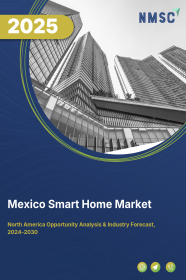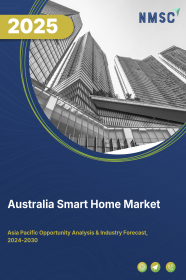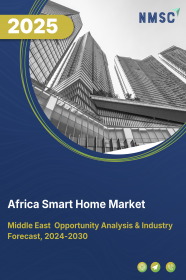
Mexico Smart Home Market by Product Type (Smart Lighting, Smart Home Security & Surveillance, Smart Entertainment, and Smart Appliances), by Communication Protocol (Wi-Fi, Zigbee, Z-Wave, Bluetooth, and Thread), by Smart Home Hubs (Standalone Hubs and Built-in Hubs), by Voice Assistants Integration (Amazon Alexa, Google Assistant, Apple Siri, and Others) – Opportunity Analysis and Industry Forecast, 2024–2030
Industry: Retail and Consumer | Publish Date: 15-Feb-2025 | No of Pages: 140 | No. of Tables: 104 | No. of Figures: 69 | Format: PDF | Report Code : RC2267
US Tariff Impact on Mexico Smart Home Market
Trump Tariffs Are Reshaping Global Business
Mexico Smart Home Market Overview
The Mexico Smart Home Market size was valued at USD 8.23 billion in 2023, and is predicted to reach USD 25.5 billion by 2030, at a CAGR of 17.5% from 2024 to 2030. A smart home, alternatively termed a connected home, denotes a dwelling outfitted with cutting-edge technology and automated systems facilitating centralized control and monitoring of diverse household devices, appliances, and security features via a unified network.
These intelligent home automation devices are remotely accessible and frequently respond to voice commands or predetermined schedules, augmenting convenience, energy efficiency, and security for homeowners. Common components of connected homes encompass smart thermostats, lighting systems, security cameras, voice assistants, and other interconnected devices aimed at enhancing the overall residential lifestyle.
Rapid Urbanization is Driving the Market Growth
The growth of the smart home market in Mexico is fuelled by rapid urbanization in the country. With nearly 80% of the population residing in urban areas, according to the United Nations Human Settlements Programme, there is a heightened demand for connected home technologies among urban dwellers.
Home automation systems and energy-efficient appliances are particularly appealing to urban residents seeking to streamline their daily routines and bolster security. The increasing desire for connected and intelligent homes in urban locales is propelling the adoption of connected home products, contributing to the Mexico smart home market expansion.
Rising GDP and Economic Growth Fuels the Market Growth
Mexico's rising GDP and economic growth is significantly boosting the Mexico smart home market demand. As the economy expands, consumers enjoy increased purchasing power to invest in connected home devices and systems.
A growing middle-class population with disposable income is increasingly inclined to embrace these technologies for their convenience, energy-saving benefits, and enhancement of overall quality of life. This favorable economic environment provides ample opportunities for the connected home market to flourish and extend its reach among Mexican consumers.
Security and Data Privacy is a Barrier to the Market Expansion
The Mexico smart home market expansion encounters a substantial obstacle in the form of security concerns and data privacy issues. Interconnected systems within connected homes, including smart thermostats, cameras, and door locks, face vulnerability to hacking, raising concerns regarding residents' privacy and safety.
Weak passwords and insufficient Wi-Fi network security measures often exacerbate this susceptibility. Exploiting these weaknesses, hackers can gain unauthorized access, potentially compromising devices or accessing sensitive information. To address these risks, homeowners must prioritize robust password practices, regularly update device firmware, and fortify home networks to diminish the threat of cyber-attacks and protect their connected homes from potential breaches.
Integration of Blockchain Technology into Smart Home Devices Presents Lucrative Opportunities for Market Expansion
Renowned for its strong security features and transparency, blockchain technology holds significant potential for fortifying the security and privacy of smart home systems. This is accomplished through the encryption and secure storage of sensitive connected home data, granting users control over access to their information and diminishing the risk of unauthorized intrusion.
Blockchain validates device identities, ensuring that only trusted devices engage within the connected home network, and simplifies operations through tamper-proof smart contracts. Additionally, it decentralizes device control, minimizing vulnerabilities and facilitating transparent management of access control and permissions.
The integration of blockchain into connected homes not only enhances security and privacy but also fosters a safer and more confidential environment. Consequently, it is poised to stimulate substantial growth opportunities within the Mexico smart home market.
Competitive Landscape
Several market players operating in the Mexico smart home industry include Schneider Electric, ABB Ltd, Amazon, Softeq Development Corp., Samsung, LG Electronics, HDL Automation , Somfy, Lorex, Lloyds.
Mexico Smart Home Market Key Segments
By Product Type
-
Smart Lighting
-
Smart Bulbs
-
Smart Light Strips
-
Smart Switches
-
-
Smart Home Security and Surveillance
-
Smart Cameras
-
Video Doorbells
-
Smart Locks
-
Security System
-
-
Smart Entertainment
-
Smart TVs
-
Smart Speakers
-
Streaming Devices
-
-
Smart Appliances
-
Smart Refrigerators
-
Smart Ovens
-
Smart Washing Machines
-
Smart Dishwashers
-
Smart Home HVAC Management
-
Other Smart Appliances
-
By Communication Protocol
-
Wi-Fi
-
Zigbee
-
Z-wave
-
Bluetooth
-
Thread
By Smart Home Hubs
-
Standalone Hubs
-
Built-in Hubs
By Voice Assistants Integration
-
Amazon Alexa
-
Google Assistant
-
Apple Siri
-
Others
By Smart Home Compatibility with Smartphones
-
iOS
-
Android
By Installation
-
DIY Installation
-
Professional Installation
By Sales Channel
-
Online Retailers
-
Retailers
REPORT SCOPE AND SEGMENTATION:
|
Parameters |
Details |
|
Market Size in 2023 |
USD 8.23 Billion |
|
Revenue Forecast in 2030 |
USD 25.5 Billion |
|
Growth Rate |
CAGR of 17.5% from 2024 to 2030 |
|
Analysis Period |
2023–2030 |
|
Base Year Considered |
2023 |
|
Forecast Period |
2024–2030 |
|
Market Size Estimation |
Billion (USD) |
|
Growth Factors |
|
|
Companies Profiled |
10 |
|
Market Share |
Available for 10 companies |
|
Customization Scope |
Free customization (equivalent up to 80 working hours of analysts) after purchase. Addition or alteration to country, regional, and segment scope. |
|
Pricing and Purchase Options |
Avail customized purchase options to meet your exact research needs. |
KEY PLAYERS
-
Schneider Electric
-
ABB Ltd
-
Amazon
-
Softeq Development Corp.
-
Samsung
-
LG Electronics
-
HDL Automation
-
Somfy
-
Lorex
-
Lloyds

















 Speak to Our Analyst
Speak to Our Analyst




















